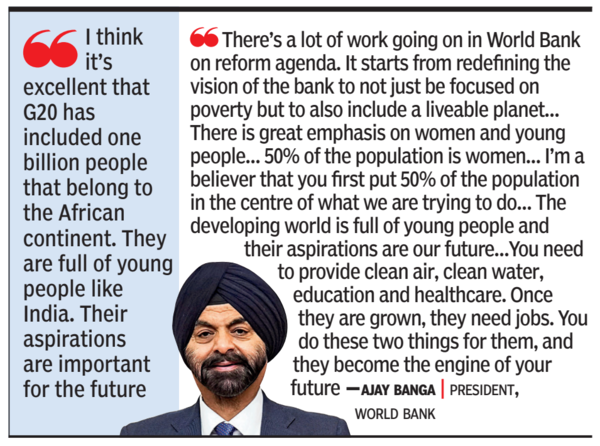On Delhi Declaration
The declaration has got many good parts. Selfishly, it has a great deal to do with the multilateral banks, which is good for me, because it gives me the wind in my sails to keep pushing for reforms and getting the bank to work better. That’s the way I think about it. Over the course of the G20, India has done a great job on its own image in branding. I compliment the PM and all of you, everybody else. I consider the fact that there was a declaration, a tribute to the fact that the G20 leadership found a way to give, take, negotiate and find a right way to agree and set a path for the world. The world is watching… the G20 has got the developed world and the developing countries.
On the consensus of Delhi Declaration
Challenges will always exist, but India has shown the way by working out a consensus. 80% of the world’s GDP was sitting in the room. If they would not agree, that would not have given a good message. I compliment India, its leadership and the G20 leaders for being able to make sure that a terrific declaration comes out.
On inclusion of the African Union in the G20
I think it’s excellent that the G20 has included 1-odd billion people that belong to the African continent. They are full of young people like India. Their aspirations are important for the future. I think this is really a good move and again, India should be complimented for championing it. But they got support from the others. I’m glad for that.

On reforms at the World Bank and IMF
There’s a lot of work going in the World Bank on the reform agenda. It starts from redefining the vision of the bank, to not just be focused on poverty, although it’s important, but to also include a liveable planet. So, the idea is to eradicate poverty on a liveable planet and by doing that, we expand the aperture of our view to include climate, pandemics, fragility and the things that we’re living through, which are intertwined with poverty alleviation and very difficult to segregate. The second thing we’re putting in there very clearly is a great emphasis on women and young people. Why these two and not everybody else? Why two specifically? Because 50% of the population is women. Even now, considering labour force participation, participation in the seniormost levels of management or their compensation or their opportunities for growth and social development are still not where they should be around the world and it’s not just a developing country issue. So, I’m a believer that you first put 50% of the population in the centre of what we are trying to do.
The second part is young people, because the developing world is full of young people and their aspirations are our future. But the trick is to give them quality of life and they are growing up. You need to provide clean air, clean water, education and health care. Once they are grown, they need jobs. You do these two things for them, and they will become the engine of your future. Our first part is this vision and inclusion. The second part is going to work better with other multilateral banks. I just announced a very big partnership with the Inter-American Development Bank on the Amazon, on Caribbean climate and on digitising governance, but then a lot of the private sector. We announced the private sector lab. The private sector that actually Chandra of Tata is one of the members of that. The objective is to get ideas from the private sector, asset managers and operators on what the bank can do to help facilitate much more investment in renewable energy in the emerging markets. And, the last part is capital adequacy. There were a lot of announcements in this event. The US has put a lot of money on the table through hybrid capital, but also through portfolio guarantees and contributions to the grip of the goods. Germany has put money on the table.